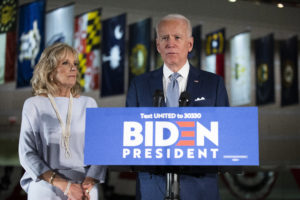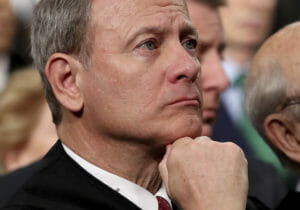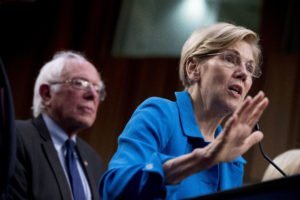Kamala Harris Has Nothing to Offer Progressives
If the California senator is already backing away from Medicare for All, why should we trust that she's committed to a Green New Deal? Sen. Kamala Harris speaks in Clear Lake, Iowa, this month. (John Locher / AP)
Sen. Kamala Harris speaks in Clear Lake, Iowa, this month. (John Locher / AP)
In the latest in a series of reversals, Sen. Kamala Harris, D-Calif., announced Tuesday that she would, in fact, be attending a CNN town hall on climate change next month after initially bowing out for a pair of California fundraisers with wealthy donors. “We were happy to change our schedule to accommodate such a critical conversation,” Harris communications director Lily Adams told the New York Times’ Astead Wesley. “As Sen. Harris has said, this is a climate crisis and is one of the most urgent reasons we need a new president.”
Progressives would be forgiven their skepticism. Last weekend, during a separate fundraiser in East Hampton, N.Y., Harris affirmed she “believes in capitalism” even if it’s “not working for most people right now” and disavowed the health care bill she co-sponsored with Sen. Bernie Sanders, I-Vt., in 2017. “I think almost every member of the United States Senate who’s running for president and many others, have signed on to a variety of plans in the Senate. And I have done the same,” she reportedly told a crowd of Tesla and Maserati owners. “[A]ll of them are good ideas, which is why I support them. And I support Medicare for All. But as you may have noticed, over the course of the many months, I’ve not been comfortable with Bernie’s plan, the Medicare for All plan.”
While Harris should be commended for acceding to grassroots organizers, the question remains: Why did she need to be pressured into doing so? And if she’s already slinking away from single-payer health care, what reason is there to believe that she remains committed to a Green New Deal?
To understand Harris’ reasoning, and why it’s so troubling for left-leaning Democrats hoping she might offer a genuinely progressive alternative to the party’s current frontrunner, Joe Biden, it’s worth examining the recent tweets of her national press secretary, Ian Sams. Defending her decision to withdraw support for Sanders’ Medicare for All proposal, Sams posted this week, “She has her own health care plan. So yeah, not a secret she isn’t running on Bernie’s plan anymore. Sorry, David”—this in response to Sanders speechwriter David Sirota’s jab that “promises to big donors in the Hamptons don’t stay in the Hamptons.” Sams also shared a tweet from Center for American Progress President and former Hillary Clinton adviser Neera Tanden that read, “Lots of senators have cosponsored lots of health care bills. Senator Sanders, to his great credit, has cosponsored other bills as well.”
In a narrow sense, all of this is true. While Sanders refused to back a House bill this year to strengthen Obamacare, he has championed (and fervently defended) the Affordable Care Act, despite his preference for single payer. At the same time, Harris’ decision to co-sponsor Sanders’ bill should neither bind her to its language indefinitely nor preclude her from offering a plan of her own. What Sams and Tanden conveniently elide, however, is that Sanders has lent his imprimatur to less ambitious legislation while advocating for a radical overhaul of America’s health care system; Harris’ proposal, by contrast, constitutes a compromise with private insurers, if not a retreat from the fundamental promise of Medicare for All.
“As presented, the Harris plan is substantially better than Joe Biden’s, and is a considerable improvement over most of the other health proposals put forward by other Democrats,” writes Richard J. Eskow for the Independent Media Institute. “It recognizes that today’s out-of-pocket health care costs are unsustainable for most Americans, even those with ‘good’ insurance. Unfortunately, it still falls short of the Medicare for All plan offered by Sen. Bernie Sanders and Rep. Pramila Jayapal.
“For one thing, her numbers don’t work. And her plan has an overarching, fatal flaw: It relies on the benevolence and good intentions of America’s health insurers.”
While Harris has pledged to cap out-of-pocket expenses at $200 per year, providing significant financial relief to millions of Americans, she has refused to raise taxes on households earning less than $100,000 annually. “That’s not nearly as good as it sounds,” notes Eskow, because working families can pay more than 10% of their household incomes on premiums. If left intact, they would make her plan prohibitively more expensive than Sanders’, which includes a progressive tax on incomes of $29,000 and higher but eliminates premiums altogether, along with co-payments and deductibles.
Still, the “fatal flaw” in Harris’ proposal lies in its phase-in period, which gives health care lobbyists a decade to sabotage Medicare expansion and relies on uninterrupted Democratic governance over that time. “In the end, we’re likely to find ourselves exactly where we are today: with a Democratic plan that has been damaged before it can be fully rolled out,” Eskow concludes. “Kamala Harris’ plan is too fragile, too complex, and—most of all—too trusting of the predatory private sector to succeed.”
Herein lies the tension of Harris’ 2020 bid, a campaign that challenges Biden’s past opposition to federal busing only to walk it back days later, promises a break from the status quo while introducing a laughable student debt forgiveness plan, refuses to engage with legitimate criticisms of her record as a prosecutor and pays lip service to progressive causes as it boasts more billionaire donors than the three leading Democratic candidates combined. In a crowded primary, Sens. Sanders and Elizabeth Warren, D-Mass., have separated themselves from the field through their commitments to democratic socialism and social democracy, respectively. Less than six months ahead of the Iowa caucus, the chasm separating them from their fellow contenders appears yawning.
Your support matters…Independent journalism is under threat and overshadowed by heavily funded mainstream media.
You can help level the playing field. Become a member.
Your tax-deductible contribution keeps us digging beneath the headlines to give you thought-provoking, investigative reporting and analysis that unearths what's really happening- without compromise.
Give today to support our courageous, independent journalists.






You need to be a supporter to comment.
There are currently no responses to this article.
Be the first to respond.